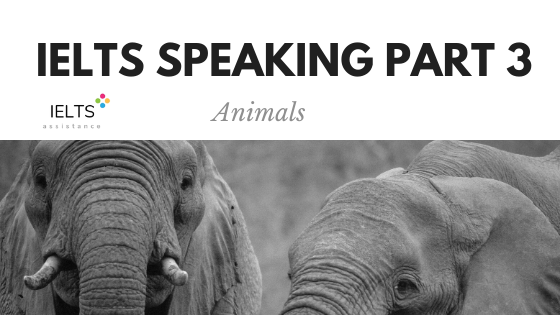IELTS Speaking Part 3 Topic
Animals

Here are some of the questions asked:
1. In what ways are humans different from other animals?
Humans are different from animals. Humans can talk and use language. Humans have big brains. Humans live in communities. Humans use tools and technology. Humans are special because of language, brains, communities, and tools.
Humans are different from animals because we can talk and use language. We have bigger brains and live together in communities. We also use tools and technology to help us. So, humans are unique because we can communicate, think, live together, and use tools.
Humans differ from other animals in various ways. One key distinction is our ability to communicate through language. Unlike animals, we have developed complex systems of speech and writing. Additionally, humans possess larger brains, enabling us to think critically and solve problems creatively. We also live in communities, forming societies that provide support and cooperation. Moreover, our capacity to invent and utilise tools sets us apart, allowing for advancements in technology and innovation. Overall, humans stand out due to our communication skills, intelligence, social structures, and technological achievements.
Humans, right, we’re pretty unique compared to other animals. I mean, just look at our language skills. We can express some pretty deep stuff with words – way beyond just basic communication. It’s like we have this whole other level of understanding and expression.
And then there’s our brains. They’re bigger, yeah? That gives us the edge in thinking things through, coming up with creative solutions, you name it. It’s like we’re wired to constantly explore and innovate.
But it’s not just about being smart individually. We’re social creatures, too. We thrive in communities, where we can share ideas, support each other, and build something greater together. That sense of connection and cooperation? It’s what sets us apart.
And let’s not forget about our knack for tools and tech. Seriously, have you seen the stuff we’ve invented? From the wheel to smartphones, we’re always finding ways to make life easier and more interesting.
So yeah, when you put it all together – our language, brains, social skills, and technological prowess – it’s pretty clear why humans are in a league of our own.
Humans stand out from other animals because we have this incredible ability to communicate using language. I mean, just think about it – we can express our thoughts, feelings, and ideas in such complex ways through speech and writing. It’s pretty amazing when you stop to think about it!
And then there’s our brains. They’re bigger than most animals’, which allows us to do some pretty cool stuff. We can think critically, come up with creative solutions to problems, and imagine things that don’t even exist yet. It’s like our brains are these supercomputers constantly working to make sense of the world around us.
Plus, we’re really social creatures. We thrive on being around other people and forming communities. Living together in societies lets us share knowledge, support each other, and build upon each other’s ideas. It’s like teamwork on a massive scale!
And let’s not forget about our knack for tools and technology. I mean, have you seen some of the things we’ve invented? From simple tools like sticks and rocks to sophisticated gadgets like smartphones and computers, we’re always finding new ways to make life easier and more efficient.
So yeah, when you add it all up – our language skills, brainpower, social nature, and technological prowess – it’s no wonder we’re so different from the rest of the animal kingdom!
In many ways they are different, but in other ways they are still quite the same. There are a lot more variations in species, which makes it really fascinating. You have animals that can fly, others can go to the deepest depths of the oceans. Animals in all kinds of colors and shapes. Yes, you also have a variety in human looks, but it is not so distinct as with all the animals combined. And yes, we have evolved and what most animals can do we can do with tools and technology. We can also fly or go underwater, we can even go to space.
So, like I said we have evolved, our brain has made it possible for us to have language, and really talk and communicate, unlike most animals which have just basic forms of communication. We have created art and culture, we invented a wide variety of tools to make our lives more comfortable. We are, or should be more civilized, but in reality we’re again not that different from animals.
Most of us are still driven by the basic emotions of fear, love, pain. Animals do feel pain the same way we do, we’re just better at expressing this pain. Any mother, animal or human has the instinct to love and take care of her children. We have just built on this basic concept of love and protection and again have made it far more complex. We all fear, humans and animals alike, they are just different forms of fear.
So deep down we’re all the same. We’ve just been luckier at adapting ourselves on this planet.
Why not have a corrected version of your answer here?
Write it in the comments below or send it to us. We’ll correct it, upgrade it and add it to our examples. Just write the question and the answer, we’ll do the rest.
2. What are the main roles of animals in your country?
In my country, animals have different jobs. Some are pets, some give us food, some help with work, and others live in nature.
In my country, animals have different jobs. Some are pets, like dogs and cats. Others help us by giving us milk or eggs, like cows and chickens. Some animals, like horses, help with work on farms. And there are also animals in the wild that keep nature balanced, like birds and insects.
In my country, animals play various roles. Pets, such as dogs and cats, provide companionship to families. Livestock like cows and chickens give us food like milk and eggs. Horses assist with tasks on farms, and guide dogs help people who are blind. Additionally, animals in the wild contribute to the ecosystem by pollinating plants and maintaining balance in nature.
So, animals in my country, they do all sorts of stuff! You’ve got your typical pets, like dogs and cats, right? They’re everywhere, keeping families company and making us all feel warm and fuzzy inside.
Then there’s the livestock, like cows and chickens. They’re the ones keeping our bellies full! Milk, cheese, eggs – you name it, they provide it. Can’t forget about them, they’re like the unsung heroes of our meals.
And let’s not overlook the working animals, like horses. These guys are out there on farms, pulling plows, and helping with all sorts of heavy lifting. And those guide dogs? They’re amazing, guiding people who can’t see and giving them independence and confidence.
But hey, it’s not just about domestic animals. We’ve got wildlife too, doing their thing in the great outdoors. Bees buzzing around, pollinating plants, birds singing in the trees – they’re all part of the ecosystem, keeping things in balance.
So yeah, animals in my country, they’re not just cute and cuddly. They’re working hard, providing for us, and keeping nature ticking along nicely. We owe them a lot!
You know, animals in my country have quite the repertoire of roles. Take pets, for instance, they’re ubiquitous companions, offering solace and joy to families across the board. Then there’s the livestock scene, with cows churning out milk and chickens laying eggs like nobody’s business – talk about essential contributions to our food supply!
And let’s not overlook the working animals; those majestic horses plowing fields and pulling carts on farms, or the remarkable guide dogs providing invaluable assistance to those with visual impairments. They’re like unsung heroes, quietly ensuring things get done and people get where they need to go.
Of course, wildlife plays its part too, you know? Bees buzzing about, pollinating plants and keeping our ecosystems thriving, and birds adding their melody to the symphony of nature. It’s this intricate web of interactions that keeps our world spinning.
So, whether they’re curled up on the couch or bustling about in the great outdoors, animals in my country are an indispensable part of our lives, contributing in ways big and small to our well-being and the harmony of our environment.
3. Why is it important to conserve the world’s animal and plant species?
It’s important to save animals and plants because they’re good for Earth. They make air clean, give us food, and keep nature in balance. Also, they’re pretty and we should keep them safe for the future.
It’s important to conserve animals and plants because they’re important for our planet. They help keep our air clean, make sure we have enough food to eat, and keep ecosystems balanced. Plus, they’re part of our world’s beauty and diversity, which we should protect for future generations.
It’s really important to conserve animals and plants because they play a big role in keeping our planet healthy. They help clean the air we breathe, provide food for us to eat, and maintain the balance of nature. Plus, they add to the beauty and diversity of our world, which is something we should definitely care about preserving for the future.
Conserving animals and plants is super important because they’re like the gears in a big machine called Earth. You see, everything in nature is connected, and if you start taking out pieces, the whole thing can fall apart.
Think about it: animals eat plants, plants give us oxygen, and together they make up these intricate ecosystems that we all rely on. So, when we protect them, we’re basically protecting ourselves and our future.
Plus, there’s the whole beauty aspect. Have you ever seen a majestic tiger or a colourful orchid? They’re part of what makes our planet so amazing, and we’d be missing out big time if they disappeared.
So yeah, conserving animals and plants isn’t just about saving cute animals or pretty flowers – it’s about making sure our world keeps ticking along nicely for generations to come.
Preserving the world’s animal and plant species is absolutely crucial. They’re not just pretty faces in nature’s gallery; they’re the building blocks of our planet’s health and stability. When we talk about conserving them, we’re really talking about protecting the very foundations of life on Earth.
Think of it this way: animals and plants aren’t just out there doing their own thing. They’re part of these intricate ecosystems, where every species plays a role in keeping things running smoothly. So, when we mess with that balance, we’re messing with the health of the whole planet – including ourselves.
And it’s not just about the environment. Sure, that’s a big part of it, but there are also economic and cultural reasons to conserve biodiversity. Many plants have medicinal properties that we haven’t even discovered yet, and animals contribute to industries like tourism and agriculture.
So, yeah, conserving animals and plants is a big deal. It’s about protecting our natural heritage, ensuring a healthy planet for future generations, and recognizing the interconnectedness of all life on Earth.
4. Which species are endangered in your country? Why?
In my country, some animals like tigers and elephants are in danger. They’re losing their homes because trees are being cut down, and people are hunting them. This makes it difficult for them to find food and places to live. So, we need to help them so they don’t disappear forever.
In my country, some species are endangered, like tigers and elephants. They’re losing their habitats because of things like deforestation and poaching. This makes it hard for them to find food and places to live. So, we need to protect them to keep them from disappearing.
In my country, there are several species facing endangerment, such as tigers and elephants. The main reasons for this are habitat loss and poaching. Deforestation is shrinking their homes, and poachers hunt them for their valuable parts like tusks or skins. These actions make it hard for these animals to survive because they lose their food sources and safe places to live. So, it’s important for us to take action to protect them and prevent their extinction.
In my country, we’ve got a few animals on the endangered list, like tigers and elephants. It’s a real shame because these guys are part of our natural heritage, you know? But the problem is, their homes are disappearing fast. We’ve got deforestation happening left and right, and that’s messing up their habitats big time.
And if that wasn’t bad enough, there are people out there hunting them down, mostly for their valuable parts like tusks or fur. It’s heartbreaking to think about these majestic creatures being killed just for profit.
The thing is, if we don’t do something about it, we could lose them forever. And it’s not just about them – it’s about the whole ecosystem they’re a part of. So, we’ve got to step up and protect them before it’s too late.
You know, it’s a bit heartbreaking to see some of our iconic animals like tigers and elephants facing such dire threats here in our country. It’s like we’re watching pieces of our natural heritage slip away right before our eyes.
The main issue here is habitat loss, which is happening at an alarming rate due to deforestation and urbanisation. These animals are losing their homes faster than ever, and they’re getting pushed into smaller and smaller areas, which just isn’t sustainable.
But it’s not just about the trees disappearing. There’s also the issue of poaching, which is still rampant despite efforts to crack down on it. People are hunting these animals for their body parts, like ivory or fur, which fetch high prices on the black market. It’s a vicious cycle of greed that’s driving these species closer and closer to the edge of extinction.
And the thing is, it’s not just about saving these individual animals. It’s about preserving the entire ecosystem they’re a part of. These animals play crucial roles in maintaining the balance of nature, and if we lose them, it could have devastating consequences for everything else that depends on them.
5. Some people believe modern farming can be cruel to animals. What do you think?
Some people think modern farming can be unkind to animals because they might not have enough space or freedom to move around comfortably.
Some people think modern farming can be tough on animals. This is because animals in farms might not have enough space to move around comfortably. Also, there are concerns that farming methods sometimes focus more on making money than on taking care of the animals’ feelings. So, it’s important to think about how we treat animals on farms
Many people believe that modern farming methods can harm animals. They say this because animals on farms are often kept in small spaces, which stops them from behaving naturally and can make them feel stressed. Also, some farming practices focus more on making money than on making sure animals are treated well. This makes people worry about how we treat animals in agriculture. So, it’s important to think about how we can farm in a way that’s fair to animals and respects their well-being. This might mean giving them more space to move around, providing better living conditions, and finding ways to ensure they are treated with kindness and compassion throughout their lives on the farm.
Some individuals express concerns about modern farming, suggesting it can be harsh on animals. This viewpoint arises because animals in such settings often experience confinement, limiting their ability to move and engage in natural behaviours freely. Additionally, there’s a perception that profit-driven practices within modern farming may prioritise efficiency over the welfare of animals, raising ethical questions about their treatment. This awareness has prompted discussions regarding the need for more compassionate and ethical approaches to farming that prioritise the well-being of animals.
Many advocates argue that modern farming practices can significantly harm animal welfare. They say this because they’ve seen animals confined in tight spaces, unable to act naturally, which affects their physical and mental health. Also, there’s a growing recognition that in today’s agriculture, making money often comes before treating animals well, raising serious ethical concerns.
With farming becoming more industrialised, we’re seeing more intensive methods where animals are crowded together in small areas. This can lead to the routine use of antibiotics and growth hormones, which further worsen the animals’ welfare.
These observations point to a pressing need to rethink how we farm. We must prioritise animal welfare while still meeting our food needs sustainably. That means moving towards farming practices that consider the animals’ needs, both physically and mentally. By promoting compassion and ethical practices in agriculture, we can aim for a balance where we produce food efficiently while treating animals with respect and care.
6. Why do many people refuse to eat meat?
7. What effects do you think humans have on wild animals?
8. What measures could we take to protect wildlife?
9. Is it the responsibility of schools to teach children about protecting wildlife?
10. Do many people in your country like to have a pet?
11. What kinds of pets are most popular in your country?
12. What are some of the advantages and disadvantages of having a pet?
13. Do you think there should be laws to protect the welfare of pets and farm animals?
14. Are there any wild animals in your country that are not found in any other country?
13. Do you think there should be laws to protect the welfare of pets and farm animals?
15. How do people in your country feel about the protection of wild animals?
16. What do you think are some of the benefits to humans of protecting wild animals?
17. What is the purpose of having zoos?
18. How do you think zoos in your country could be improved?
19. Do you agree that animals should be used for scientific testing of chemical products such as new medicines, new cleaning products or new cosmetics?
Get your writing and speaking corrected
Join the ever growing group of students who we helped on the road to success and get the professional help you have been looking for.



2 Responses
I’m amazed by the depth of knowledge you’ve shared in this article. It’s truly enlightening.
Hello Alex,
Thanks, this means a lot
If there is anything I can help you with please let me know.
Kristof